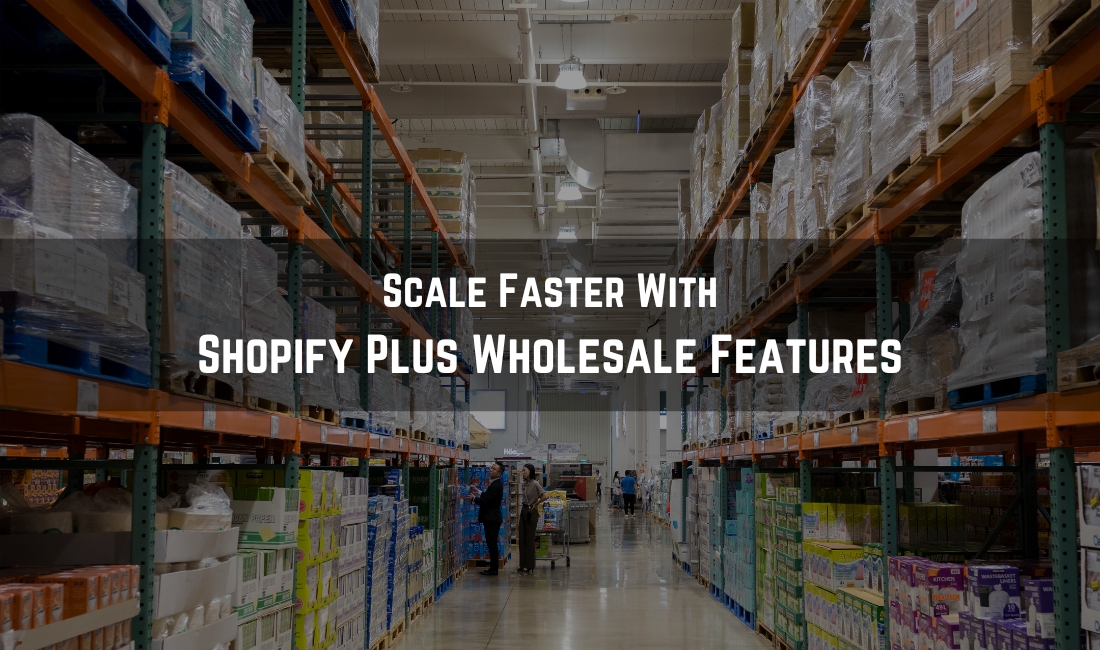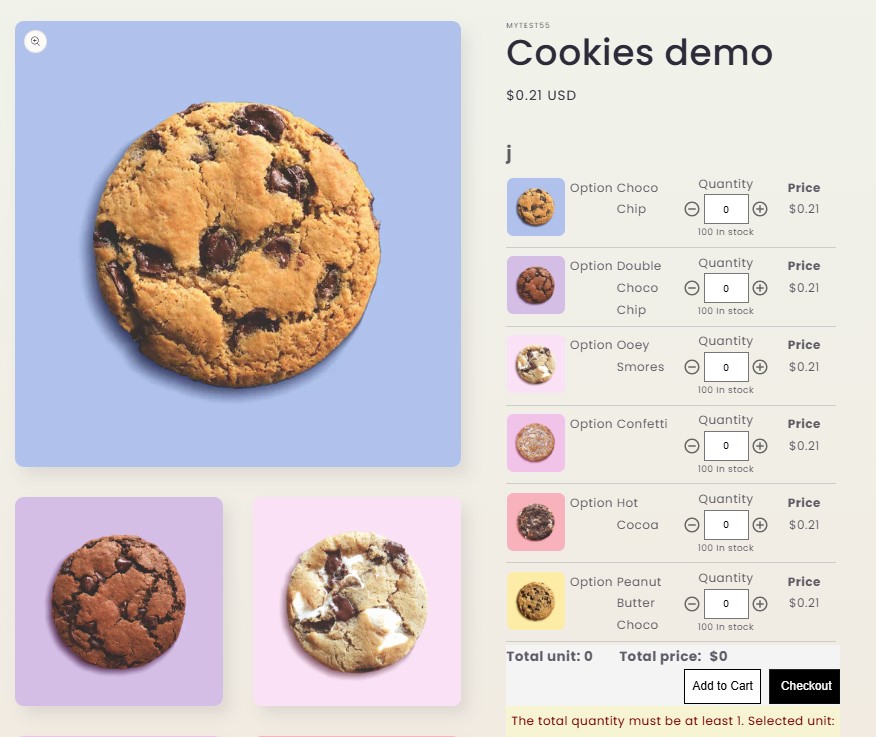
Shopify Plus for wholesale helps merchants run B2B sales without messy workarounds. They simplify pricing, reorders, and bulk management so you can serve wholesale buyers smoothly.
Wholesale isn’t easy. Merchants often struggle with:
- Setting fair prices for different buyer types
- Managing large, repeat orders without errors
- Keeping multiple systems in sync
This is where Shopify Plus comes in. Instead of juggling apps or spreadsheets, it gives you built-in tools for custom price lists, quick reordering, and automated workflows. Everything happens inside one platform, so you don’t waste time fixing manual mistakes.
In this article, we’ll walk through Shopify Plus wholesale, how they solve real B2B problems, and how you can use them to grow faster.
Table of Contents
Why Company Profiles and Catalogs Are Game-Changers for B2B Sales
B2B buyers expect a shopping experience that feels tailored, not generic. Shopify Plus wholesale features like Company Profiles and Customer Catalogs make this possible. Instead of juggling manual discounts or sending custom invoices, you can create structured profiles that reflect each buyer’s unique terms. Pair that with catalogs that only show relevant products, and you get a smoother, more professional wholesale process. These tools don’t just save time; they help you build stronger, lasting relationships with wholesale customers.
Company Profiles For Tailored Pricing, Shipping, And Terms
Every wholesale buyer is different. A boutique might order small batches with flexible shipping, while a large retailer needs bulk pricing and strict payment terms. Shopify Plus Company Profiles let you handle both without extra admin work. You can assign custom prices, shipping methods, and payment options to each account, so every customer sees what’s right for them the moment they log in. No need for back-and-forth emails or messy spreadsheets. This tailored approach simplifies logistics and keeps buyers happy, making it easier to grow your wholesale business while offering consistency and professionalism.
Customer-Specific Catalogs For A Personalized VIP Shopping Experience
Nothing frustrates wholesale buyers more than scrolling through products that don’t apply to them. Shopify Plus solves this with customer-specific catalogs. You can curate product visibility so each buyer sees only what’s relevant—whether it’s seasonal stock, exclusive items, or bulk-friendly SKUs. This makes the shopping experience feel personalized, almost like a VIP treatment, while reducing order errors. Buyers save time, and you keep full control over what’s being purchased. It’s not just a convenience; it’s a subtle way to show customers that their needs are recognized and valued, which goes a long way in B2B relationships.
Avoid One-Size-Fits-All Pricing And Control What Buyers See
Wholesale pricing isn’t one-size-fits-all, and treating it that way can cost you loyal customers. Shopify Plus lets you move beyond generic discounts by assigning unique pricing rules and curated product access per customer. That means no more giving away unnecessary discounts or showing irrelevant stock. Instead, buyers feel like the store was built for them, which improves trust and encourages repeat purchases. It’s smarter selling: more control for you, a smoother buying journey for them. Everyone wins.
The Easiest Way to Keep Wholesale Buyers Coming Back
Repeat orders are the lifeblood of wholesale. But if buyers have to dig through catalogs or call you every time they want to restock, they’ll eventually look for an easier option. Shopify Plus fixes this with one-click reordering.
When customers log in, they can view their order history and instantly reorder past purchases. No fuss, no manual entry, no wasted time. This feels seamless for them and reliable for you; orders are faster, cleaner, and less prone to mistakes.
Take salons and boutiques, for example. They often reorder the same supplies each month: shampoos, styling products, and seasonal stock. Instead of repeating the whole shopping process, they just click and confirm. That convenience builds loyalty. The easier you make reordering, the less chance they’ll shop around.
Think of it as locking in recurring revenue: keep the process effortless, and wholesale buyers will keep coming back without hesitation.
Flexible Payment Options That Keep Cash Flow Healthy
Wholesale deals often involve bigger orders and longer payment cycles, so cash flow can get tricky. Shopify Plus for wholesale gives you the flexibility to offer different payment options without chasing clients. From upfront payments to invoicing, you can set terms that suit each buyer, keeping your finances steady while making life easier for customers.
Vaulted Cards, PayPal, Invoicing, Custom Payment Terms
Shopify Plus lets you accept payments the way wholesale buyers prefer. You can safely store vaulted cards, allow PayPal, send invoices, or set custom terms. This flexibility means no more forcing every client into a single payment method. It reduces friction at checkout and helps speed up transactions, which keeps orders moving and your business cash-positive.
Match Payment Terms To Clients Who Need To Retain Big Accounts
Large wholesale buyers often expect extended terms or specific invoicing options. Shopify Plus makes it easy to match their expectations without breaking your process. Offering 30-day terms or flexible payments can secure those big, high-value accounts. When clients feel supported, they’re more likely to stay loyal, place larger orders, and see you as a long-term partner instead of just another supplier.
Unlocking Advanced Wholesale Power With Shopify Plus APIs
Shopify Plus APIs give wholesale merchants the flexibility to go beyond standard platform features. With APIs, you can automate complex workflows, manage pricing at scale, and tailor the buying experience for B2B clients without being limited by the default Shopify interface.
APIs let you create dynamic price lists, manage multiple product catalogs, handle complex B2B orders, and organize customers into groups for targeted discounts or promotions. For example, you can automatically update pricing tiers for different client types, or push product information to a wholesale portal in real time.
Some tasks, like creating basic customer groups or setting standard discounts, can be done using Shopify Plus’s built-in tools. But more complex workflows, such as syncing an ERP system to automatically update pricing and inventory across multiple channels, usually require a developer. Knowing when to DIY and when to bring in technical help ensures your wholesale operations scale efficiently without costly mistakes.
With Shopify Plus APIs, you can streamline processes, reduce manual errors, and give your B2B clients a seamless, professional buying experience.
Limitations of Shopify Plus
Shopify Plus is powerful for B2B and high-volume brands, but it’s not perfect. Here are the main limitations of Shopify Plus you should know:
1. Limited Native B2B Features
- Draft orders, catalogs, and customer profiles work for many use cases, but advanced needs like bundles, subscriptions, and complex pack rules still require third-party apps.
- Wholesale automation is good, but not as customizable as a fully tailored ERP or custom-built system.
2. Customization Still Needs Developers
- Plus offers APIs and checkout extensibility, but to truly customize workflows, storefront logic, or ERP integrations, you’ll likely need a developer.
- “Out-of-the-box” only goes so far for complex B2B setups.
3. Transaction Fees With Third-Party Gateways
- If you don’t use Shopify Payments, extra transaction fees apply. For merchants processing large B2B volumes, this adds up.
4. Limited Native Multi-Store Management
- Plus allows up to 9 expansion stores, but managing multiple storefronts (different regions, languages, or currencies) can get messy without additional tools.
5. Tax, Duties, and EDI Limitations
- Shopify Plus doesn’t natively handle complex tax scenarios, compliance-heavy industries, or full EDI workflows. These usually need third-party apps or integrations.
6. Cost Barrier
- At around $2,000/month (or more at scale), Shopify Plus is a big step up in price. For smaller merchants, it may not justify the investment.
7. Less Flexible Than Fully Custom Platforms
- While Plus is highly scalable, merchants needing total control over every detail (like in Magento or a custom build) may find Shopify limiting.
Do You Still Need Third-Party Apps With Shopify Plus For Wholesale?
Shopify Plus gives merchants a lot of built-in B2B tools. You can manage catalogs, set up customer profiles, automate workflows with Flow, and handle draft orders, all without extra apps. For many wholesale operations, these features cover the essentials, keeping costs low and processes simple.
But sometimes, built-in features aren’t enough. If you need advanced restrictions, displaying all the variants in one product page, subscription management, complex pack discounts, or integrations for tax and EDI, many third-party bulk order apps are still valuable. They fill the gaps Shopify Plus doesn’t cover natively, giving you flexibility without overcomplicating your setup.

Decision Checklist: Cost Vs Benefit, Complexity, Integration, Scale
When deciding whether to add an app, weigh four factors:
- Cost vs Benefit – Will the app save enough time or boost revenue?
- Complexity – Can your team manage it easily?
- Integration – Does it work smoothly with Shopify Plus and other systems?
- Scale – Will it grow with your business needs?
Start by testing Shopify Plus features first. Only layer in apps if you encounter gaps. This approach keeps your tech stack lean while giving you advanced capabilities where they truly matter.
Final Takeaway
Wholesale comes with unique challenges – pricing tiers, bulk reorders, payment terms, and complex customer needs. Shopify Plus for wholesale helps merchants handle these without messy workarounds. With built-in tools like company profiles, custom catalogs, draft orders, and automation, you can run B2B sales smoothly inside one platform.
That said, Plus isn’t a silver bullet. For advanced bundles, subscriptions, or complex tax and EDI setups, third-party apps may still be necessary. The smartest approach is to start with Shopify Plus features, then add apps only if gaps remain.
At the end of the day, Shopify Plus gives you a solid foundation for wholesale growth. It simplifies operations, reduces errors, and makes your buyers’ experience smoother—so you can focus less on admin and more on scaling your B2B business.
Shopify Plus For Wholesale: FAQ
What are the limitations of Shopify Plus?
Shopify Plus is powerful, but it has some limits:
B2B features – Built-in tools cover catalogs, profiles, and draft orders, but advanced needs like bundles, subscriptions, and complex packs need apps.
Customization – Big changes or ERP syncs usually need a developer.
Transaction fees – Extra fees apply if you don’t use Shopify Payments.
Multi-store – Expansion stores are included, but managing them can get tricky.
Taxes & EDI – Complex tax, duties, or EDI setups require third-party tools.
Cost – Starts around $2,000/month, so not ideal for smaller businesses.
Flexibility – Less control compared to fully custom platforms.
When should you use Shopify Plus?
Shopify Plus makes sense if your business has outgrown regular Shopify. It’s a good fit when:
You’re doing high sales volume (usually $1M+ a year).
You need B2B features like custom catalogs, price lists, and draft orders.
You want to automate workflows (approvals, invoices, order updates).
You manage multiple stores or regions and need expansion stores.
You require advanced integrations with ERPs, CRMs, or custom apps.
If your store is smaller or doesn’t need heavy B2B tools, regular Shopify is usually enough.
Is Shopify Plus better than regular Shopify?
It depends on your business. Shopify Plus is built for high-volume and B2B merchants. It offers advanced features like:
Custom catalogs and price lists
Automated workflows with Shopify Flow
Draft orders and wholesale tools
More API access and up to 9 expansion stores
For smaller stores, regular Shopify is usually enough. But if you’re managing big sales volumes, complex B2B needs, or multiple storefronts, Plus is the better choice.
